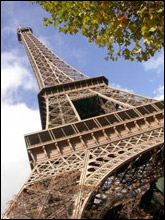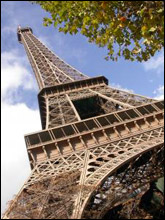
A landmark achievement.
Photo: David Roussel “vecko.”
Ahhh, the French. Toujours inexplicable. They chain smoke. They drink enough espresso before noon to cause lockjaw. And they jam their veins with butter, cheese, and beef. But despite how reckless they seem, their leaders recently made a stand for public health, granting every citizen the right to a balanced and healthy environment.
That’s right. In their battles against climate change, genetically modified organisms, and nuclear reprocessing, the French now enjoy the support of an “environment charter” amended to the country’s constitution. “Decisions made responding to today’s needs should not compromise the capacity of future generations and other populations to satisfy their own needs,” the document’s preamble proclaims. In 10 articles, it then outlines a series of environmental rights and responsibilities incumbent on the French people, ranging from the right to access information about the environment to an obligation upon political leaders to promote sustainable development.
The charter, ratified this spring, was the pet project of President Jacques Chirac, who first championed it at the time of his 2002 reelection. At first, the idea met with the typical opposition from business groups. But Chirac, an astute politician, piggybacked the charter onto an important national assembly vote that would clear the way for the European Union constitution referendum.
In doing so, he undermined resistance from the right, which was willing to go along with the add-on to ensure support for the E.U., explains David Michel of the Center for Transatlantic Relations at Johns Hopkins University. While the E.U. referendum was later defeated by a popular vote, the environmental charter (which wasn’t put to the people) had already prevailed by a margin of 531 to 23 in a special joint session of the French parliament.
Hard Chirac Cafe
 Chirac (left): sticking it to Bush?So why, readers may ask, would a conservative, business-friendly president expend clout on a high-profile environmental initiative? Chirac, who has been a strong supporter of the Kyoto climate agreement and who delivered an unusually blunt speech at the Johannesburg world summit, seemed earnestly to believe in the idea. But there were also political motivations.
Chirac (left): sticking it to Bush?So why, readers may ask, would a conservative, business-friendly president expend clout on a high-profile environmental initiative? Chirac, who has been a strong supporter of the Kyoto climate agreement and who delivered an unusually blunt speech at the Johannesburg world summit, seemed earnestly to believe in the idea. But there were also political motivations.
Internationally, France likes to be a leader on all matters European. And when it comes to the environment, France conspicuously lags behind other countries in the union, falling behind on implementing the E.U.’s green directives, according to Yannick Jadot, campaign director for Greenpeace France. (“Directives,” in E.U.-speak, are requirements for member countries to pass specific laws.) The charter was seen as a sort of nuclear option that would catapult France to the forefront. Moreover, by elevating the country’s environmental profile, Chirac would drive the wedge deeper between Paris and that crass, unpopular Texan in the White House. “The charter enables France to stick its thumb in the eye of the U.S.,” says Michel.
On the domestic front, despite health habits that might perplex Americans, the French populace actually has a substantial environmental ethic. For example, citizens have valued natural foods and non-industrial farming since long before the organic craze got traction in the U.S.; food labels go so far as to describe the type of sustenance served to chicken or cattle. When it comes to energy, a French person consumes only about half the Btus of an American, and the nation has cut its emissions of carbon dioxide by 20 percent since 1980, to the lowest levels in Western Europe. (By contrast, emissions have increased in the U.S. by about 22 percent in the same period.)
And in recent years, a chain of environmental mishaps has left many French feeling under siege — and demanding answers. These threats have included mad cow disease; “Frankenfoods” from the U.S.; a series of unusual storms on the continent, including one that ravaged trees in the historic gardens at Versailles; an unusually strong summer heat wave blamed for the death of thousands of senior citizens; and a pair of oil spills — from the ship Erika, off Brittany, and from the Prestige, off nearby Galicia — that devastated birds and fish and soiled hundreds of miles of beaches.
But what does the charter really mean? Is it strong enough to calm Gallic nerves? Will the threats abate? Will the clouds in French cafés dissipate, and Parisian streets no longer be minefields of poodle turds?
Well, maybe. It’s too early to tell for sure. While pundits agree that the charter can’t be ignored, they debate the extent to which it will really make a difference.
Vive la Difference
The French hailed the charter as a first of its kind, and proponents described it in grandiose terms. The amendment “raises sustainable development to the highest level in our legal structure, alongside the 1789 Declaration of the Rights of Man and of the Citizen,” declared former Prime Minister Jean-Pierre Raffarin before it was passed.
In truth, constitutional environmental rights turn out to be more the rule than the exception. Of the world’s 190-odd nations, the constitutions of 117 mention protection of the environment or natural resources, according to an analysis by Earthjustice. Fifty-six — including unlikely progressives such as Tajikistan and Angola — explicitly recognize the right to a clean and healthy environment; 20 hold those who harm the environment liable. The U.S. Constitution, by contrast, contains no explicit environmental reference.
Jeremy Shapiro, a France expert at the Brookings Institution, points out that while the charter certainly makes a difference, it is not as colossal as it might be in an American context. First, constitutional amendments don’t represent the monumental social shifts that they typically have in the U.S. Nor are they very rare: France’s current, 1958 constitution carries 19 amendments, five of which have been enacted since 2000.
Additionally, Shapiro argues that unlike in the U.S., where lobbyists and courts influence the interpretation of laws, the French government maintains a high degree of control over its legal creations. As a result, he says, France “can pass something like this that’s politically popular but, within limits, not have to live with the consequences.”
Enforcement and interpretation of environmental rights largely depend on the Conseil Constitutionnel, or Constitutional Council. That body reviews laws in a role similar to the Supreme Court in the U.S., but answers the queries of parliamentarians, reviewing the legal code to determine constitutional compliance, rather than hearing cases brought before it by outsiders. As a result, the French system is more directly controlled by elites, and less accessible to the public. “The Conseil is not the kind of place where civil-society groups can exercise influence,” Shapiro says. “It’s made up of the grandees of French political life. They’re not going to be environmental experts.”
The charter also depends on a fair bit of idealistic, but “unactionable,” language. For example, it calls for environmental education and training, and suggests that research and innovation contribute to the preservation of the environment, but it doesn’t commit to specific goals or standards on either of these items.
The American Chamber of Commerce in France, which represents giant American corporations operating in the world’s ninth-biggest economy, yawned at the entire matter. Not only did the ACC decline to lobby the issue, it hardly followed the debate. “Almost all of the environment and workplace safety laws in Europe originate in Brussels” at the European Union, explains managing director Stephen B. Pierce. “We don’t even have an environment committee in France anymore.”
Throw Precaution to the Wind
Where the charter does pack a legal punch is in Article 5, which enshrines the precautionary principle into the constitution. In the case of potentially serious and irreversible environmental damage, the article states, officials should implement measures to minimize the risks. The precautionary principle had already been embodied in French law in 1995, another reason why the charter’s opposition didn’t call in the big guns. Yet there is little doubt that elevating it to a constitutional level bolsters the green arsenal.
Now the principle trumps other legislation, and on routine government business that pits the environment ministry against, say, the energy ministry, the former will have enhanced fire power. Environmental groups can also conduct their business with the gravitas of a constitutionally guaranteed right behind them. This principle could be used, for example, to restrict genetically modified foods, until scientists can show that they are safe. And it will likely come into play in the near future as the country debates whether to replace or simply decommission nuclear power plants, which supply about three-quarters of France’s electricity. (Which “serious and irreversible” risk looms larger: the unknown hazards of long-term radioactive waste storage and Chernobyl-type accidents, or the cataclysmic risk of climate change, for which proponents argue nuclear power is a remedy?)
Still, if the example of other countries is any indicator, French greens will have to fight to sharpen the teeth on their charter. “Russia’s constitution has one of the strongest environmental guarantees in the world. It goes on for pages,” says Patrick Parenteau, director of the environmental law clinic at Vermont Law School. “China has a good one too, but they’re both meaningless. They’re not enforceable.”
But others do carry legal heft. In 2004, the Costa Rican Supreme Court used the nation’s guarantee of a “healthy and ecologically balanced environment” to hold customs officials responsible for not cracking down on fishing vessels using local ports to ship shark fins. (Fishers slice off the fins to make the Asian delicacy shark-fin soup, a practice that is damaging the predator’s populations and endangering the balance of aquatic ecosystems.)
“A constitutional guarantee is not just a wonky law,” says Marcello Mollo, a lawyer at Earthjustice. “It shows that a healthy environment is a human right. And as seen in the Costa Rican case, it gives rise to a whole host of legal remedies that don’t exist under normal environmental law.”
For their part, eager French citizens wasted no time in invoking their new rights, albeit in a manner far more pedestrian than its framers may have imagined — and with mixed results that may foreshadow the results of future struggles. No, they didn’t attempt to shut down “les McDo.” Instead, a group of conservation organizations used the charter to get a court to block a 100,000-person rave that was to be held in an area outside Paris recognized for its environmental value. The case was filed, and the injunction awarded, just as les raveurs were scheduled to arrive.
The charter definitely made a difference: the groups were only able to get the injunction in time “because the case was urgent, and it concerned a fundamental right of the French constitution,” says Michel. But in the end, local officials failed to enforce the injunction. The rave went on as scheduled, trashing the site.



